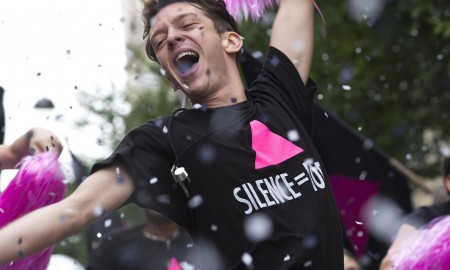ROBIN CAMPILLO: BPM/120 BATTEMENTS PAR MINUTE (2017 - NYFF) - PARIS NAHUEL PÉREZ BISCAYART IN BPMLove and AIDS activism in gay Paris
NAHUEL PÉREZ BISCAYART IN BPMLove and AIDS activism in gay ParisIn his film, Robin Campillo depicts the life of French ACTU-UP in the early Nineties, fighting against government and Big Pharma indifference to gay AIDS suffering in France as the original New York ACT-UP had done to American straight mainstream non-cooparation starting in 1987. Campillo's stirring film is both universal and personal. It evokes many communities' struggles against an indifferent world, or youth against hostile elders. It's also a personal, individual homage to a time when Campillo himself was an activist, and it's a moving portrait of love heightened by closeness to tragedy.
As I watched
BPM, I often thought of David France's documentary about ACT-UP in New York
How to Survive a Plague (
ND/NF). I also remembered living in San Francisco in the early Eighties, when I'd open the two gay weekly newspapers every Monday and page through one photo after another of young men cut down in their prime by the terrible new disease. Campillo vividly evokes the heightened atmosphere of those times. Bdyond anything that happens here, I value the atmosphere it creates and the times and emotions it leaves one to muse upon.
As I wrote of France's film, "People were dying left and right, life was tragic, but people had a palpable sense of the need to go for broke, and the leaders were heroes who were the best they could be."
BPM effectively captures this feeling with a vivid, well-chosen cast and a fluid, emotionally intense movement, slipping from one sequence into another to show how the same spirit inspired them all. At the center are Sean Dalmazo (Buenos Aires-born Nahuel Pérez Biscayart,
The Aura,
Glue) and Nathan (Arnaud Valois), two activists, from the original core of French ACT-UP who become lovers. The memorial for one of them at the end, bringing together all the original activists, serves as a ritual representing the innumerable losses.
BPM isn't about the horror of AIDS and doesn't emphasize gruesome symptoms but it does have a bit of realistic anal sex. However, it's primarily about activism. Its core is debate, conducted by rules to keep unnecessary talk minimal. The group applauds by finger-snapping to interrupt talk less: this finger-snapping approbation gives the gatherings their unique flavor - and also Campillo's habit of shifting seamlessly to another scene and another debate to move things forward. The film is staunchly improvisational, its speeches passionate and off-the-cuff, and the whole inspired by a team spirit that fits the action. Debate is the essence, but it's stripped down so as to find the most effective strategies.
Alternating with debate, and eventually love story, are the shock tactics, notably the throwing of fake blood at establishment objects. These passages make explosions of energy releasing what's pent up in the tedious arguments and laborious bureaucratic dealings, and the alternation gives the film a vigorous rhythm. But while it has energy and movement,
BPM is deliberately "untidy," flaunting rough edges, though still full of articulate writing, with Campillo and Laurent Cantet collaborating here as they did for Cantet's
The Class.The title, the average heart rate, may evoke Larry Kramer's classic autobiographical play and New York HIV-AIDS account
The Normal Heart[/I, but Campillo's film is more understated than American accounts, and in particular isn't out to provide indoctrination or instruction, to feed us dates and names and lines of demarcation. This I found refreshing and also, moving. It allows us to enter more freely into the mood.
[i]BPM/120 battements par minute, 140 mins., debuted at Cannes 20 May 2017, winning the Grand Prix, Queer Prize and FIPRESCI Prize, also showing in two dozen other international festivals, including the Main Slate of the New York Film Festival.





